Thursday,January 28, 2021 /03:00 PM / By Proshare Research/ Header ImageCredit: EcoGraphics
Executive Summary
Hold on to your dream. Don't let past failures or direeconomic forecasts make you a pessimist. Keep your youthful dreams alive andcreate your own opportunities. - Paul Zane Pilzer
PaulPilzer may well have been making a pitch to Nigerian youths, as the events ofthe last twelve months have been disruptive enough to shoot down stars from theclearest of skies. The 2020 coronavirus pandemic was a scorching experiencethat drilled massive holes into the pockets of governments around the world ascitizens queued up at isolation centres to fight off a venomous disease,lacking in empathy.
Hospitalscame under strain as health workers and patients caught the bug and deathloomed like a Godzilla. Factories closed dust-caked windows, cinemas wentsilent and airplanes lay like coffins on parade as economies slowly butpainfully sank into despair. Nevertheless, with 2020 in the rearview mirror,and factories gingerly restarting to hum again as airlines and airplanesreawake, analysts are more optimistic at the beginning of 2021 than they werepessimistic at the end of 2020. Dreams are coming alive and opportunities seemto be reemerging.
Nigeria in Six Charts
Nigeria'seconomy went into free fall in Q2 2020 as the coronavirus pandemic worsened andtumbling international oil prices poisoned an already difficult situation. Bythe end of the second quarter the country's gross domestic product (GDP), ameasure of economic output, shrunk by -6.10% beforerecovering in Q3 2020 by -3.62%. Thetwo-quarters of negative GDP growth nudged the economy into an officialrecession with job loss rates rising and inflation rate scampering. A fewanalysts believe that the 2020 economic decline was less severe than would havebeen the case if the Central Bank of Nigeria (CBN) had not adopted a policy ofquantitative easing (QE) and the ministry of finance (MoF) had not permitted alarger-than-expected fiscal deficit. Subsequent information suggests that the CBNhad put in the palms of the fiscal authorities a shimmering N2.38trn creditlifeline by its ways and means mechanism, hence leaving the finance authoritieswith a massive future fiscal funding gap of over N2trn.
Thecountry's macroeconomic balance can be viewed in six charts and a theory.
GDP- Understanding the Chicken Run
Nigeria'sGDP has had an interesting run as it has dipped and swerved from optimisticgrowth to scary depression, back to growth, and then on to depression in 2020.Before 2015, the economy's growth engine had purred at a nice pace of slightlyover +6% as it drove smoothly along anupward trajectory from an average of +6.23% in2014 but slipped to an average of +3.2% in2015 and slammed the brakes as it skidded into a recession between 2016 and Q12017.
GDP fell from -0.67 in Q1 2016 to -1.49% in Q2, -2.34% inQ3, and -1.73% in Q4 by Q1 2017 GDP saw a slight but still negative recovery of -0.91%.As the global recession passed by in Q2 2017 and GDP growth ramped up to +0.72%, theeconomy appeared to be on the mend even though the population growth rate wasplodding ahead at a disturbing +2.6% perannum (see chart 1 below).
Chart 1: Nigeria's GDP GrowthRate (%)
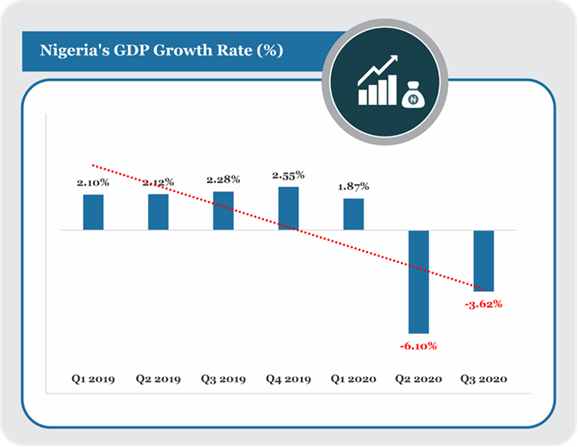
Theharsh times of 2016 left the jobless rate up in double digits, while domesticconsumption stumbled and manufacturers saw net sales slide, the purchasingmanager's index (PMI) equally took a knock. The GDP growth reversal in 2017 put smiles on manufacturers' faces as outputrose as the jobless rate started to fall with GDP growth rising from +2.11% in Q4 2017to +1.95% in Q1 2018 and +2.38% in Q4 2018. In between Q1 and Q4 2018, thegrowth rate fell to +1.5% in Q2 and +1.81% in Q3.
Manufacturersand workers were optimistic that 2019 would prove better than the previousyear, 2020, and they were right. GDP rose by +2.1% in Q1 2019, +2.12% in Q2, +2.28% inQ3 and +2.55% in Q4. The first quarter of2020 saw GDP growth rate climb by +1.87% before the coronavirus outbreak led toa reversal with Q2 2020 witnessing a major contraction as GDP growth slid by -6.10% before retracingits steps in Q3 2020 with the growth rate slowing less rapidly by -3.62%.
Nigeria'sGDP chicken run over the last seven years has reflected uncontrollableexternal factors and perfectly controllable policy choices. The country'sfiscal and monetary policies have often been out of alignment and the route todesired economic prosperity has been littered with hope rather than logic,ethnic bias rather than a competitive advantage, and favouritism rather thancompetence.
Inflation Rate- When What is Real Begins to Matter
Nigeria'slatest inflation figures for December 2020 showed that headline inflation grew by +15.75% and food inflationspiked at +19.56%, an indication thatdomestic real asset values were being pulverized as the country's poverty indexhit new highs.
Therise in domestic prices has been unnerving in the last two years as headline inflation has steadily increased without let. In January 2019 inflation rate wasjust over +11% but by October the rate hadrisen to +11.61% and by year-end December2019 inflation rate had skimmed just under +12% to +11.98%.
WithCOVID-19 fears kicking-in by Q1 2020, the inflation rate rose more sharply assupply chain links were decoupled and factories' gates closed. The country'sinflation rate in January 2020 was +12.13% byMarch it had risen to +12.26%, in June 2020the domestic inflation rate had scrambled up by a further +12.56%. By the end of Q3 2020, the domesticprice level had again increased by +13.71%.The beginning of Q4 2020 saw the inflation rate leap further by +14.23% as the delayed impact of earlier input supplydisruptions, farmgate security challenges, and land border closure combined toknock the wind out of the economy's sail (see chart2 below).
Chart 2: Nigeria's Inflation Rate(%)
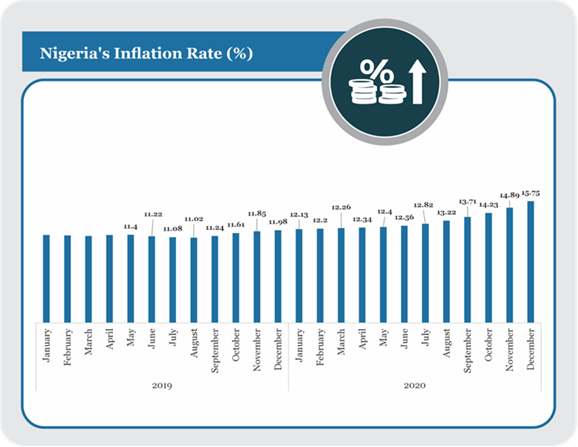
Thisexplains why the inflation rate still rose in December 2020 by +15.75%, a throwback to November 2017. Thecontinuous rise in the inflation rate in 2020 hurt the value of financialassets as real yields took a beating as inflation-adjusted returns becamenegative leading to several investors leaping out of fixed income securitiesand seeking solace in the equities market. The NSE All Shares Index (ASI) went up +50.03% year-t0-date (YTD)at the end of 2020, making it the best performing market in Africa (see the section on the African equities market in thisreport).
Withthe inflation rate at +15.75%, it would takeonly four years and three months for the value of every naira asset to be worthroughly half of its present value, if the double-digit rate persists. If themonetary authorities are to encourage savings in the country (a critical factorin wriggling away from slow medium-term growth), real rates of return on depositsmust go up by between 10% and 12%, otherwise, owners of idle cash balanceswould probably search for near-liquid assets that track inflation much better.
Goodinvestors search for value but great investors search for inflation-proofedvalue, a growing number of Nigerian investors are moving from good to great.
Debt -Staying Catholic, Or Perhaps Not?
Nigeria'sdomestic and foreign debt numbers have easily galloped in the last six years.Nigeria's combined domestic and foreign debt numbers rose from N12.6trn in 2015to N17.4trn in 2016, at the beginning of a short-cycle recession. The debt figure continued to rise with a recovery in GDP growth numbers in 2017as Nigeria's total debt stock climbed to N21.7trn.
Thelow-growth recovery of GDP between 2017 and 2018 was unable to stop the viralgrowth of debt as Nigeria's debt stock has continued to rise, leapfrogging fromN24.4trn in 2018 to N27.1trn in 2019. In H1 2020 the total national debt hadrisen to N31.01trn (see chart 3 below).
Chart 3: Nigeria's Total Debt (N'trn)
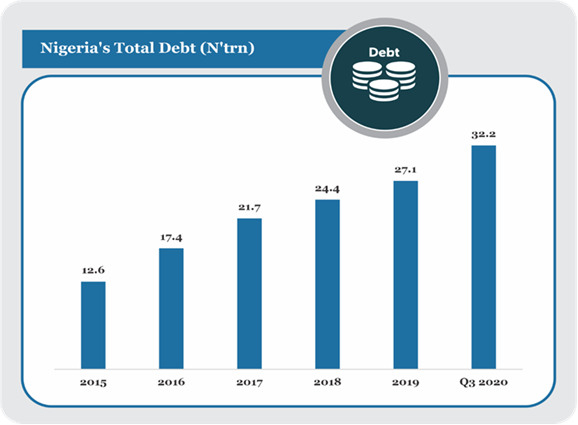
Thefive-year compound annual growth rate (CAGR) of the nation's total debt was 21.1% as of 2019, but the rate could be closer to +16% if 2020 debt numbers are taken intoconsideration and a base rate adjustment is made. For example, if the H1 figureof N31.0trn were to be used to calculate CAGR for full-year 2020 and the baserate was shifted to N17.4trn for 2016, the new five-year growth rate would be +15.62%. If the Q3 2020 figure of N32.22trn isapplied the CAGR would be +16.65%.
Thegrowth rate of debt is higher than the growth rate of inflation, therebyworsening the plight of taxpayers. Taxpayers would be slammed with an 'inflation tax' as they would also be forced to pay for higher fiscalborrowings. The double whammy of abstinence from Catholic prudence and cheerfulfiscal spending leaves no heavenly solace for the innocent. Taxpayers will haveto hunker down and grit their teeth in 2021 as they pay for public sectorexuberance.
PMI-Making Manufacturers Cry
Itwas tearful. Nigeria's manufacturing sector in 2020 was slam-dunked. TheCOVID-19 pandemic cut supply lines, deferred production inputs, and primed thepump for expensive inventories. This translated to higher costs (debt servicedoes not sleep during pandemics), lower or non-existent operating cash flow,and rising cost-0f-carry.
Thecountry's purchasing managers' index(PMI) seesawed between 57.1% and 60.8% in2019 but slumped between 41.4% and 51.1% in 2020. In June 2020 the Indexcollapsed to 41.4% amid the coronavirus economic lockdowns but bounced backmildly in July to 44.9% before rising a notch to 46.9% in September andthen skipped to 49.4% in October, 50.2% in November, and dropped to 49.6% inDecember 2020. The gradual rise in the PMI towards the end of the year,according to analysts, reflects a slow but noticeable turnaround in thecountry's economic fortunes (see chart 4 below).
Chart 4: Nigeria's ManufacturingPMI (%)
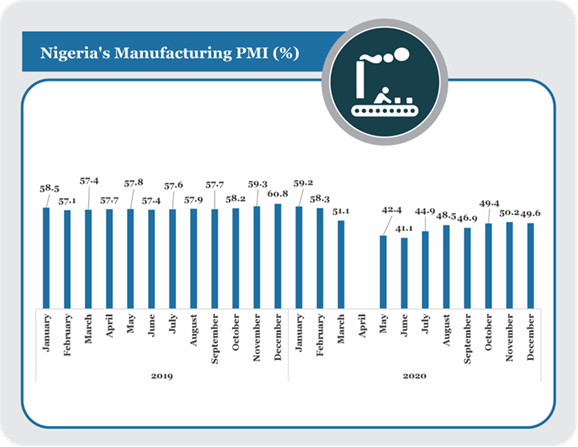
Nigeria'smanufacturing sector is expected to chug along modestly in 2021 but a lotdepends on how quickly the COVID-19 pandemic is resolved and how fast domesticsupply rigidities are addressed.
Unemployment-Hard Times, and Swollen Feet
Nigeria'sunemployment rate has once been described as a mystery locked inside a box, as thebureau of statistics has done a marvelous job of keeping up with macroeconomicdata on every other headline macroeconomic indices except the national unemployment rate. Indeed, inquiries concerning the Q4 2018 to Q1 2020 unemploymentnumbers revealed that the federal government had been shy in spending money oncollating the unemployment figures for the missing periods for reasons that areyet to be explained (see chart 5 below).
Chart 5: Nigeria's UnemploymentRate (%)
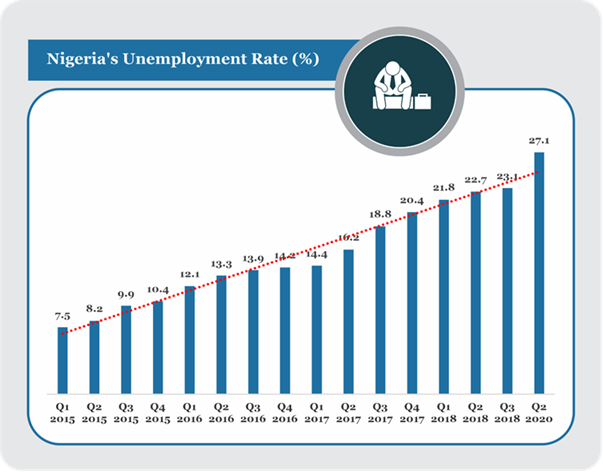
Theunemployment rate for Q2 2020, however, stood at 27.1% up from 23.1% in Q32018. The reason why the rising unemployment rate is such a major concern inNigeria is that it is estimated that over 60% of the country's population isbetween the ages of 16 and 35 years, making it one of the youngest populationson the planet. This implies that the demography would require broader access toqualitative education, superior healthcare facilities, and improvedopportunities for their skills and learning to be deployed to rapidly growingsectors of the economy. So far, has not happened.
Thestructure of the Nigerian economy (high dependence on oil for foreign exchangeearnings and low domestic manufacturing activities) suggests that many youngpersons will remain unemployable. The country has an estimated 40.5m small andmedium-sized businesses with the majority of these enterprises barely able toscrap up decent earnings as high running costs clip their wings. Unfortunately,the country's educational system has only recently started to reposition itsadmission policy and curricula to favour the hard sciences in contrast toliberal arts and the social sciences. The mismatch between qualifications andjob requirements will produce a pressure cooker society with crisispersistently simmering just beneath the surface.
Indeed,the difference between the skills the Nigerian economy needs and the skillsNigerian youths possess can only worsen the domestic unemployment rate andraise touchpoints for social disaffection, dislocation, and revolt. Analystshave noted that the problem starts with a slow-moving economy that has idledalong at a rate below the +2.6% annualpopulation growth rate, thereby reducing the country's income per person.
Tobe sure, for those who have taken time to monitor unemployment, disaster doesnot always come in a flash, it sometimes grows like an Indian Baobab tree, slowat first until it reaches a tipping point, where it explodes into a forestgiant. Behavioural economists note that social crisis stares Nigeria in theface if it does not pull its GDP up by at least an additional 8% per annum. Thequietly climbing jobless rate could very suddenly burst into a mass movement oftroubled youths seeking work and finding long queues, frustration, and sorefeet.
Althoughbandaged feet are bad enough, it would not be as damaging as the bruised egos,the sense of despair, and the burning desire to make somebody pay for theirhardship.
Capital Importation-When Foreigners Vote with their Dollars.
Aswas noted in the previous section Nigeria has a myriad of socio-economicchallenges that threaten growth and stability, prominent of which has beenunemployment and underemployment. However, to help temper the severity of theproblem imported capital has proved supportive as international investors pourdollars into the local economy, and Nigerians in the diaspora take a hard lookback in search of higher investment yields.
Capital importation has been wavering in the last half-decade between 2016 and 2020. At thebeginning of the economic recession in 2016 capital imports became historicallylow. Imports were almost forgettable over the four quarters of 2016 but rosenoticeably as the global economy shrugged off the after-effects of the economicdownturn by Q3 2017. In the third quarter of 2017 capital importation got toUS$ 4.15bn before climbing to US$5.38bn in Q4 of the same year. Withglobal economies showing signs of a sustained recovery in 2018, and investorconfidence springing back as they become less risk-averse, the capitalimportation figures spiked as capital inflows rose to US$6.3bn in Q1 andUS$5.51bn in Q2 2018.
Risingcapital import continued in Q1 2019 after a sharp drop to US$2.86bn in Q3 andUS$2.14bn in Q4 2018. Capital imports in Q1 2019 hit a high of US$8.51bn beforedropping back to US$6.05bn in Q2 and US$3.8bn in Q4 2019. Surprisingly, thebeginning of 2020 saw capital importation rise strongly to US$5.85bn in Q1 atthe start of the coronavirus pandemic, even though, Nigeria was not immediatelythreatened by the outbreak. By Q2 2020 with the decision to partially lockdownthe Nigerian economy the levels of capital importation shrank. For example, capitalimportation fell from US$5.85bn in Q1 2020 to US$1.29bn in Q2 and US$1.46bn inQ3 2020, representing two low-base capital import figures that were last seenin the recessionary year of 2016 (see chart 6 below).
Chart 6: Nigeria's CapitalImportation ($'bn)
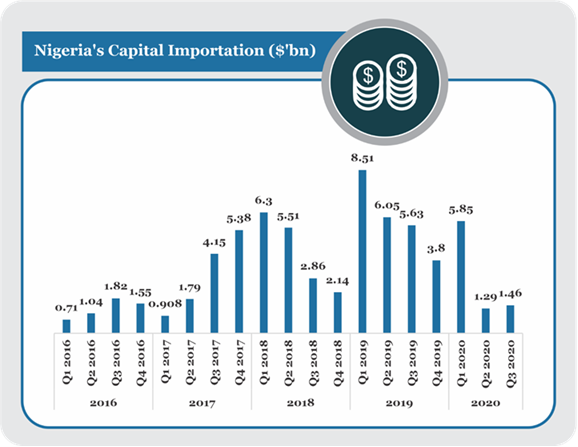
A Rebound and Alphabet Soup
Theoutlook for the Nigerian economy in 2021 is mildly optimistic. Analysts believethat GDP would grow at a steady rate of between +1.5%and +2.4% as manufacturers regaintheir bearings, supply chains become reestablished and consumer demand rises.However, much depends on how fast coronavirus vaccinations can be provided forthe most vulnerable members of the population. The projection that 40% (orroughly 80m citizens) of the population would receive vaccinations in the yearis wildly hopeful. The country would at best vaccinate a fraction of theproposed number.
Thismeans that herd protection may become increasingly critical in keeping theeconomy open throughout the year. The various governments would need to keepcitizens safe by enforcing non-pharmaceutical measures to bring down thenumbers of infected people. The COVID-19 inter-personal contact protocols wouldneed rigorous adherence to stop the rapid communal spread of the virus inplaces like Lagos state, Rivers state, and Abuja. Besides, the distributionconsideration for vaccines must shelve the suboptimal concept of so-called 'federal character' and deal with epicentres faster than places with lowervirus incidences.
Ifthe economy stays open throughout the year, the letter W would more closelydescribe its recovery pattern, in contrast to other alphabet patterns such as Vwhich suggests that the economy will not suffer a growth relapse as a result ofthe virus or the letter K which indicates that larger corporations will reboundmore quickly than their smaller counterparts who may suffer a steady decline asthey find it difficult to reestablish supply chains and recover customerdemand.
Morerecently some local economists have proposed a square root recovery which wouldinvolve a small and short GDP uplift before a long decline followed by a steeprecovery that heads into a period of flat future growth. This shaped recoveryis theoretically plausible but practically unlikely.
Indeed,the growing consensus amongst local analysts is that the W-shaped recoveryremains the most likely portion of the alphabet soup of recovery outcomesexpected between 2021 and 2023. A lot, however, depends on how well thegovernments at different levels handle the COVID-19 pandemic. An acceleratedspread of the disease could pivot recovery from a W-shaped recovery to anL-shaped one with manufacturing and output sliding down and getting caught in alow-base growth trap.
Ifthe virus is tackled effectively without necessitating a renewed shutdown, thengrowth will progress steadily while the inflation rate falls gradually betweenQ3 and Q4 2021. Without a further lockdown inflation rate may average +14.2% in 2021, as it adjusts downwards from therecent December 2020 rate of 15.75%.Analysts expect inflation to be above 15% inboth Q1 and Q2 2020, as food inflation remains a worrying fixture of domesticconsumer prices.
Illustration 1:Government Policies Enacted in 2020 and Impacts on Nigerian Commodities
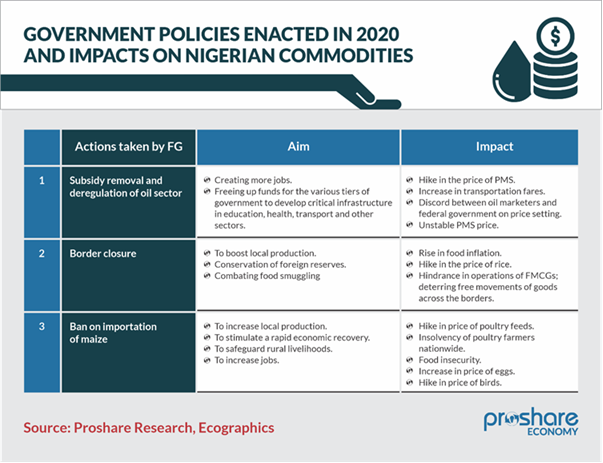
Theescalating insecurity in the country's farm belt as a result of incessantattacks of farmers by gun-wielding cattle herdsmen will put pressure onfarmgate food supplies. This would worsen the preexisting farming problems ofpoor road networks, the absence of bulk farm produce storage facilities, androad levies charged by non-state actors along traditional rural to urban centrefarming routes.
Section1 of the report takes an overview of global economiesand how they have coped with the coronavirus pandemic and the global economicoutlook for 2021. The section also looks at African economies and how they willshape up to meet the challenges of 2021 as global supply chains becomerecoupled and international trade becomes gingerly restored.
Thesection dissects the Nigerian economy while delivering a few prognoses. Itnoted that opening closed land borders, improving domestic healthcaremanagement, and creating supporting infrastructure could help to push up growthand reduce inflation rate uncertainty. According to the report, "The recent decline in the rate of contraction could betied to the easing of restrictions on businesses, the reopening ofinternational and domestic travels, and a resumption of wholesale and retailtrading activities. The shift in the economic needle in the last three monthsreflects an expected rebound in businesses but still carries the threat of apandemic-induced reversal accompanied by a potential fall in oil demand andprices".
Illustration 2: Understanding the Economy; Beyond the Numbers
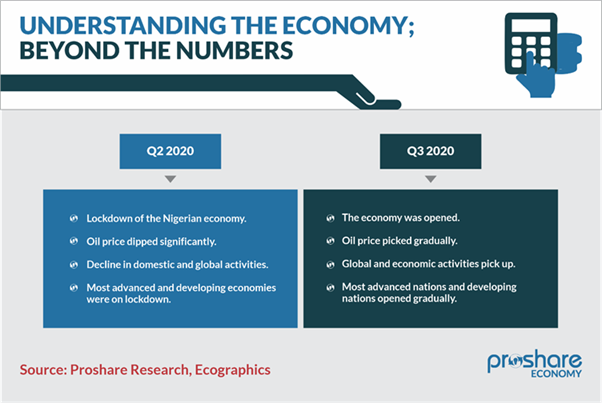
Thereport looked at the major economic numbers that characterised 2020. It alsolooked at the year beyond the numbers and settled on a few base rateassumptions about 2021 and how economic agents look at the way things couldshape up. Section 1 equally took a position of the prospects for capitalimportation, investment, consumption, monetary and fiscal policy, trade, anddomestic unemployment (see Nigeria's unemploymentdistribution in illustration 3 below).
Illustration3: Distribution of Unemployment in Nigeria
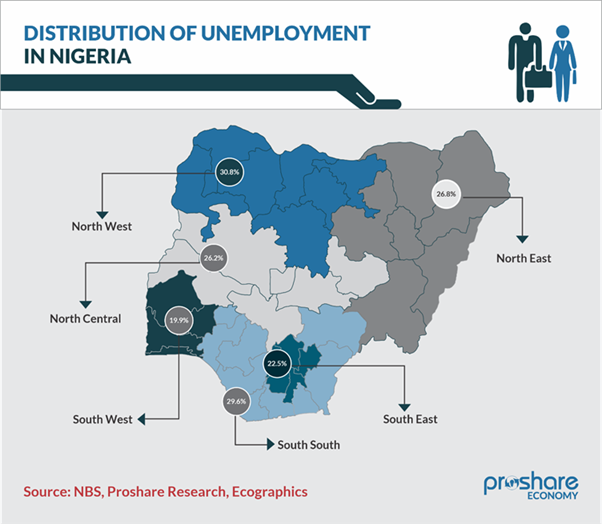
Insection 2 the report reviewed the country's major economic indicatorsand drew up frameworks under which the economy could see growth in 2021.Furthermore, the section forecasted how the various economic indicators wouldfare in 2021 (see illustration 4 below)
Illustration 4: Macroeconomic Forecastfor 2021
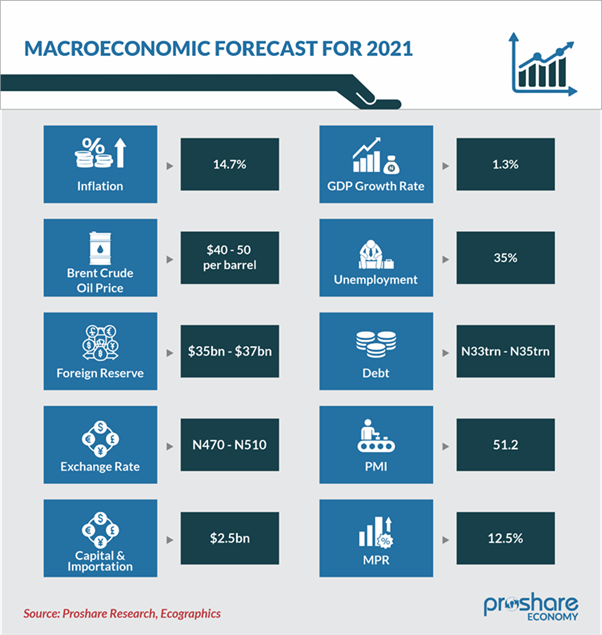
Section3 reported what was turning into a perfect policy stormin 2020 and its implications for 2021. The report considered how both theFederal Ministry of Finance (MoF) and the Central Bank of Nigeria (CBN) werepairing up to meet the challenges of inflation, unemployment, and falling GDPgrowth in addition to how the COVID-19 pandemic was wedging a spanner in theworks. The report noted that "As COVID-19 took a biteout of economic activities and international oil prices, investors pulled backfrom intended capital commitments as they decided to sit on the fence. Theuncertainty in the global economy has since hurt domestic investment flows".
Investorsare expected to return in Q2 2020 as supply chains gradually become restoredand uncertainty about the future pivots towards optimism. With COVID-19vaccination being administered globally, economies are expected to open up astravel numbers rise, and the hospitality sector experiences greater naira flowsas theatres, parks, event centres, and other public places gradually restoreactivities to their pre-COVID-19 levels. The growth in businessactivities will open the wallets of investors as they see mega naira cash flowsin the future becoming a real proposition.
Section4 looked at how the different sectors of the economyfared in 2020 and what the tea leaves have said about their fortunes in 2021.The COVID-19 pandemic affected Nigeria's various economic sectors differentlywith some sectors winning and others ending up with black eyes. Winnersincluded technology-based companies including companies in thetelecommunications and entertainment sectors. Losers included shopping malls,cinemas, clubs, restaurants, hotels, airlines, manufacturing companies, and toa lesser extent logistic firms.
Thesection provided scenarios under which reversals could occur in each sector andprovided context for expected 2021 industry narratives.
Section5 addressed market indicators and how financial marketsfared amid the COVID-19 pandemic. It took a scenic detour across variousmarkets and painted the picture of what was, is, and could be for the marketsin 2021.
Section6 of the report concentrated on the ten megatrends thatare likely to define the economic and financial arena that Nigerians willreside in 2021. It plays up the big moves that will shake up the world ofNigerians the way they have known it. From changing educational templates toflexible working arrangements, the next normal will see a shift in socialrelationships and mental perception. According to the report "The newdigital work culture accelerated by the global health pandemic may lead topermanent changes in the way people work, live, and even love".
Thereport notes that "Nobody can say for now how successful a vaccine would bein containing the spread of the virus. There are different expectations basedmore on hope than science. If the vaccine works well, then economies willrevert to pre-COVID-19 outputs, incomes, and job rates within eighteen months.Nevertheless, this is conjecture rather than fact. A lot will depend onthe vaccine's efficacy and the speed with which it is circulated and used. Sofar, judging from the distribution of the vaccine in the USA and Europe,enthusiasm appears mooted".
Section7 concludes the report and conjectures on how Nigeriacan take advantage of the ongoing economic and health challenges to reset theeconomy and establish an equitable and productive society committed to the bestof global economic and democratic practices (seeillustration 5).
Illustration 5: 10 Trends That WillShape 2021
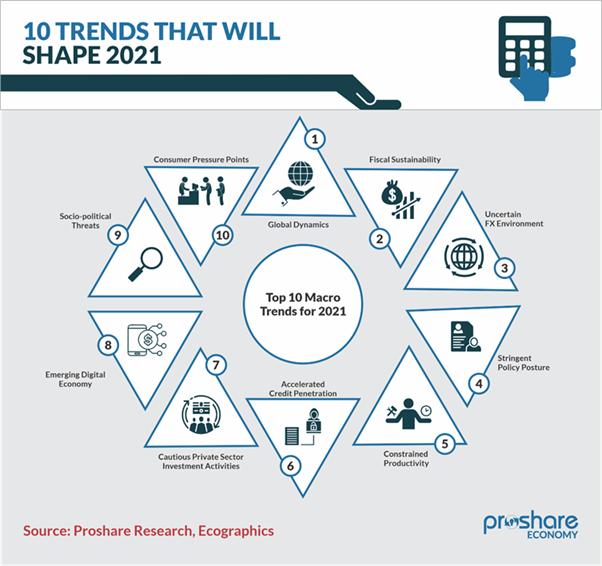
Watch Video
Downloadable Version of Goodbye 2020,Hello 2021, Understanding the Mega Trends of a Crucial Year for an EconomyReport (PDF)
1. Complete Report: Outlook 2021: Understanding the Mega Trends of a Crucial Year for anEconomy- Jan 28, 2021
2. Executive Summary: Outlook 2021: Understanding the Mega Trends ofa Crucial Year for an Economy- Jan28, 2021
Related Links
1. Outlook2021: Understanding 2021's Mega Trends
2. Outlook 2021:Emerging Technologies Have Potential to Spur Growth
3. Outlook2021: A Gaze into Market Performance - Nigeria and the Commodities Market
4. Outlook2021: A Gaze into Market Performance - Equities Market
5. Outlook2021: A Gaze into Market Performance - Fixed Income and Currency Markets
6. Outlook2021: How Sectors of the Economy Fared in 2020 - Transportation Sector
7. Outlook2021: How Sectors of the Economy Fared in 2020 - Finance and Insurance Sector
8. Outlook2021: How Sectors of the Economy Fared in 2020 - Telecommunication Sector
9. Outlook2021: How Sectors of the Economy Fared in 2020 - Oil and Gas Sector
10. Outlook2021: How Sectors of the Economy Fared in 2020 - Agriculture Sector
11. Outlook2021: How Sectors of the Economy Fared in 2020 - Manufacturing Sector
12. Outlook2021: A Review of Monetary and Fiscal Policies Introduced in Nigeria in 2020
13. Outlook2021: Inside a Perfect Storm: Monetary and Fiscal Sword Fencing -Monetary Policy
14. Outlook2021: Inside a Perfect Storm: Monetary and Fiscal Sword Fencing - Nigeria'sFiscal Policy
15. Outlook2021: The Year 2020 in Retrospect - A Bleak Year for Households
16. Outlook2021: Eyeballing Major Economic Indicators in 2020 - Exchange Rate
17. Outlook2021: Eyeballing Major Economic Indicators in 2020 - Nigeria's Public Debt
18. Outlook2021: Eyeballing Major Economic Indicators in 2020 - Trade Balance
19. Outlook2021: Eyeballing Major Economic Indicators in 2020 - Capital Inflow
20. Outlook2021: Eyeballing Major Economic Indicators in 2020 - Unemployment
21. Outlook2021: Eyeballing Major Economic Indicators in 2020 - GDP
22. Outlook2021: Eyeballing Major Economic Indicators in 2020 - Inflation
23. Outlook2021: Examining Global Economic Indicators - Trade
24. Outlook2021: Examining Global Economic Indicators - Unemployment Rate
25. Outlook2021: Examining Global Economic Indicators - Inflation Rate
26. Outlook2021: Examining Global Economic Indicators - GDP
27. Outlook2021: Examining Global Economic Indicators - PMI
28. Outlook2021: Fiscal and Monetary Measures Were Applied to Cope With the Effect ofCOVID-19
Related News on Growthand Recovery
1. AfricanStatistical Yearbook 2020: Africa Experienced Strong GDP Growth from 2000 to2019
2. How CountriesAre Performing on the Road to Recovery
3. World BankAppears Less Optimistic About Growth Prospects Across the Globe
4. Corruption andCOVID-19: The Pandemic Has Heightened The Importance of Stronger Governance
5. Global OutputExpected to Expand by 4% in 2021, Still Below Pre-Pandemic Trend
6. AfDB Takes Stepsto Accelerate the Circular Economy in Africa
7. World Bank Groupto Boost Nigeria's Efforts to Reduce Poverty
8. IMF StaffCompletes 2020 Article IV Mission to Nigeria
9. Open Trade andEconomic Inclusion Key to Post-COVID Recovery
10. AfDB's AgriPitchCompetition Awards $120,000 in Prizes to African Youth Agripreneurs
11. Bridging theDigital Divide to Scale Up the COVID-19 Recovery
12. AfDB, AIFFounding Partners Announce Postponement of the Africa Investment Forum to 2021
13. Remittance Flowsto Shrink 14% by 2021 Due to COVID-19
14. How COVID-19Will Increase Inequality in Emerging Markets and Developing Economies
15. SSA October 2020Regional Economic Outlook: A Difficult Road to Recovery
16. Communique ofthe 42nd Meeting of the IMFC Chaired by Mr. Lesetja Kganyago
17. WEO: A Long andDifficult Ascent - Global Growth Projected at -4.4% in 2020
18. IMF ExecutiveBoard Approves the Extension of Increased Access Limits Under the RCF and RFI
19. IMF ExtendsImmediate Debt Service Relief for 28 Eligible Low-Income Countries for 6-months
20. Reform of theInternational Debt Architecture is Urgently Needed
21. AfricanDevelopment Bank Named to the Board of World Business Angels Investment Forum
22. COVID-19'sNegative Impact on Health and Education May Last Decades
23. Opening Remarksat the 2020 International Conference on Sustainable Development
24. World Bank SetsAmbitious Targets for Green and Resilient Economic Growth in Africa
25. SupportingMigrants and Remittances as COVID-19 Rages On
26. IMF ManagingDirector Georgieva's Remarks at the Global Steering Group Global Impact Summit
27. SupportingPublic Private Partnerships in Africa: AfDB Ready to Scale Up
28. Event of theFinance Ministers on Financing for Development in the Era of COVID-19 andBeyond
29. Nigeria in theTime of COVID-19 - Rising to the Challenge
30. Final Communiqueof the 55th AGM of the Board of Governors of AfDB
31. COVID-19:Without Help, Low-Income Developing Countries Risk a Lost Decade
32. 2020 AnnualMeetings of the AfDB: A Renewed Commitment to Economic Resilience in Africa
33. Tourism Trauma andCOVID-19
34. COVID-19: YouthResilience is the Boost We Need Right Now
35. External SectorReport: Global Imbalances and the COVID-19 Crisis
CMO Reports
1. Nigeria: 2021Full Year Outlook - Awaiting Dawn
2. Bracing for aDifferent Future - Meristem Annual Outlook 2021
3. 2021 EconomicOutlook - Light at The End of The Tunnel
4. TheNigerian-British Chamber of Commerce 2021 Economic Outlook
5. Q1 2021 FXOutlook: Risk-on Stages a Comeback
6. Nigeria EconomicOutlook 2021: A Shot at Recovery
7. 2021 Outlook -Is The Tunnel Getting Darker or Brighter
8. Nigeria in 2021:Positioning in the New Normal
9. Nigeria 2021Outlook - Navigating Unsteady Terrain
10. Nigeria FY 2021Macroeconomic Outlook - A Break in the Clouds
11. Nigeria 2021Outlook: COVID-19 Recession and the Long Road to Economic Recovery
12. Q4 2020 EconomicOutlook: Out of Reverse and into Second Gear
13. Nigerian EquityMarket Outlook: COVID Out, Riots In?
Related News on Reviews and Outlooks
1. Candid Dialogueon Africa's Investment Landscape
2. Negative Outlookfor Sub-Saharan African Sovereigns as Debt Costs Will Intensify Post Pandemic
3. TheNigerian-British Chamber of Commerce 2021 Economic Outlook
4. Fitch RevisesCoronation Merchant Bank's Outlook to Stable; Affirms IDR at 'B-'
5. Moody's -Nigeria's Deficit and Debt to Stay High After Coronavirus and Oil Shocks
6. Moody's TakesRatings Actions on 32 Banks in Africa Following Update to Country CeilingsMethodology
7. Risks toNigerian Banks' Asset Quality Loom in 2021 and Beyond
8. Moody'sAnnounces Changes in Country Ceilings Following Methodology Update
9. Fitch RatingsSees Gradual Recovery for African Banks in 2021
10. DCSL to hold its13th Webinar Series Focused on the Year 2020 Business Review
11. UncertainRecovery: 10 Macro Trends That Will Shape 2021
12. Fitch AffirmsSeplat at 'B-'; Outlook Positive
13. Agusto and CoUnveils its 2020 Consumer Digital Banking Satisfaction Index
Related News on MonetaryPolicy
1. Monetary and InterestRate Policy in 2021: Going for Growth
2. CBN to SustainExpansionary Monetary Policy Till Q1, 2021 - Cordros Securities
3. Ten MPC Members,One Shared Outlook
4. Further Slowdownin PSCE Growth in November 2020
5. PersonalStatements By The MPC Members At The 133 MPC Meeting of Nov 23-24, 2020
6. CBN Rolls theDice to Tackle Market Liquidity and Dollar Dearth
7. Implications ofCBN's Introduction of Its Special Bills to the Market
8. CBN IntroducesSpecial Bills to Deepen the Financial Markets, An Additional Liquidity MgmtTool
9. FalteringIncreases in Private Sector Credit Expansion
10. Post-November2020 MPC View: Back to the Committee's Favoured Stance
11. CBN CommuniqueNo. 133 of the MPC Meeting - Nov 23-24, 2020
12. As Expected, MPCRetains All Key Parameters At The End of November 2020 Meeting
13. Monetary PolicyCommittee Decision Preview: MPC Expected to Retain Policy Parameters - AccessBank
14. A Pause toReflect from the MPC
15. LDR Policy: OverOne Year After, Where Are We?
16. Monetary PolicyResponse in Emerging Market Economies: Why Was it Different this Time?
17. Endorsement ofthe CBN's Development Finance
18. Slowdown in theExpansion of PSCE
19. PersonalStatements By The MPC Members At The 132 MPC Meeting of Sep 21-22, 2020
20. MPC SurpriseRate Cut: Limited Impact on Credit Growth
21. LDR Policy:Plausible But Insufficient to Stimulate Growth
22. Banks Lend, theCBN Pushes Forbearance
23. Low LiquidityExpected to Dampen Impact of Lower Rates
24. PossibleImplications of MPC's 100bps Policy Rate Cut
25. CBN CommuniqueNo. 132 of the MPC Meeting - Sep 21-22, 2020
26. CBN MPC ReducesMPR to 11.50%, Retains Other Parameters After Sept 2020 Meeting
27. An Eye intoPossible MPC Outcomes
28. MPC Preview:Balancing FX Stability and Moderating Economic Contraction
29. Several Pointersto Same Again From the MPC
30. Implications ofCBN's Downward Review of the Interest Rate on Savings Deposit
Related News on FiscalPolicy
2. SERAP Calls forSimplification of Government Processes for COVID-19 Management in Nigeria
3. SERAP Calls forNo Budget Allocation to MDAs That Fail to Remit to Federation Account
4. FGN RevisesExcise Regime and Removes Import Duty on Materials Used in The Production ofBanknotes
5. DMO ClarifiesChina's Loans to Nigeria; Economic Viability and Revenue Issues Left Out
6. Taiwo Oyedele ToSpeak on Nigeria's Fiscal Sustainability Tomorrow on WebTV
7. Suleyman NdanusaTo Speak on Nigeria's Revenue Diversification Tomorrow on WebTV
8. Addendum to the2020 - 2022 MTEF and Fiscal Strategy Paper
9. LCCI ReportAffirms Need for Fiscal Authorities to Act
10. Framework forthe Management of COVID-19 Funds in Nigeria under the Treasury Single Account
11. COVID-19:Federal Government Exempts Medical Supplies from VAT and Import Duty
12. Stimulant isNecessary but not Sufficient - FDC
13. Fiscal Position:Still Critical but Temporary Panacea in Sight
14. Pick and Mix inNigeria's Response to the COVID-19 Virus - FBNQuest
15. FG Adds toArmory for COVID-19 Showdown
16. COVID-19:Federal Government of Nigeria Announces Fiscal Stimulus Measures
17. Fiscal andMonetary Responses to COVID-19 Menace: Racing Against Time
18. FG LaunchesFinancial Transparency Policy Portal
19. Treasury SingleAccount - The Puerto Rican Government Earned $49m in Interest Fiscal YTD
20. Friedrich Hayekand The Price System: The Future Of Classical Liberalism and The Free Market
21. Economic andInstitutional Restructuring for the Next Nigeria - Soludo
22. How GovernmentPolicy Affects Business , Society In National Development and ChangingEnvironment
23. Nigeria's FiscalQuandary: A Revenue Problem Or A Debt Problem?
24. Irrespective ofWho Wins 2019 Elections, ERGP Should Be Sustained - Toyin Sanni
25. 2019-2021 MTEFand Fiscal Strategy - First Fiscal Projections Through to 2021
26. Government RoleIn The Economy - Differentiating Policies And What Elections2019 Comes Down To
27. FederalGovernment releases 2018 Fiscal Policy Measures
28. Buhari SignsBills Granting Financial Autonomy To State Assembly And Judiciary; Signs 3Others
29. NESG leadsDiscourse on Low Carbon Investments Opportunities in Nigeria
30. NESG establishesNigeria Fiscal Policy Roundtable to help boost government revenues
Related News on NigerianEconomy
1. Nigerian GDPBetter Than Thought
2. Inflation SpikesDespite Harvest and Land Border Re-opening
3. Nigeria's MiseryIndex Rises as Inflation Reaches 15.75%
4. FGN to ConvertCBN Loans to Tradable Securities as Debt Soars
5. HeadlineInflation Increases by 15.75% YoY In December 2020, 0.86% Higher Than November2020 Rate
6. FGN's ExternalDebt Service Obligations Reached a Total of US$507m in Q3 2020
7. Nigeria's HighRecurrent Costs, Low Revenue and Escalating Debt Numbers
8. 62.18% ofNigeria's Total Public Debt as of Q3 2020 Was Domestic - NBS
9. Q4 2020Macroeconomic and Markets Report - Growth Expectations Remain Gloomy for NigerianEconomy
10. Rising Crude OilPrices and the Nigerian Economy
11. COVID-19Containment and ESP Implementation Key for Nigeria's Economic Recovery - Prof.Akpan Ekpo
12. Q3 2020 DebtStock: World Bank Almost The Largest External Creditor
13. HeadlineInflation to Continue its Runaway Trend in December 2020
14. FGN's DomesticDebt Service on a Plateau, Totalled N604bn in Q3 2020
16. PMI Reading No93: A Seasonal High for the Year
17. Nigeria's PublicDebt Stock as of September 30, 2020 Stood at N32.22trn
18. The Year 2020 inRetrospect: A Bleak Year for Households
19. All CommodityGroup Import Index Rose by 1.89% in Q3 2020 - NBS
21. PMI ReadingsShow Pessimism in the Month of December 2020
22. FGN's Q3 2020Deficit on Target, Spending Compressed
23. CBN Poll:Respondent Firms Expect the Naira to Depreciate Next Month
24. Economic Crisisto Sink 7million People into Poverty in Nigeria
25. RevenueCollection Again Below Benchmark in Q3 2020
26. CBN Poll: 60.8%of Respondents Believe Nigerian Economy would End Up Weaker if Prices RiseFaster
28. The Nigeria's FXCrisis: Overarching Consequences of Insecurity and Structural Deficiency
Special Reports & Publications
1. Oil and Gas:Working the New Normal in the Time of a Pandemic
2. Banks in H12020: Imagining Beyond COVID-19
3. OnlineTrading Ranking Report 2020 - Trading in a Period of a Virus; Building GoodHabits
4. Banksin H1 2020: Imagining Beyond COVID-19
5. CEO Remuneration2020 Report: Between 2019 and 2020; Understanding The New Realities
6. Memo To AMCON:Nigerian Tax Payers are not Responsible for Repayment of Bad Debt
7. Coronanomics (1)- Understanding the Realities of an Impending Recession
8. Bank NPLs - The Case for a New Industry Approach
9. NCM2020 - Fin.MKT in Transition: Understanding Past Uncertainties; Preparing for NewPossibilities
10. Banks' H1 2019Numbers: Top Line Growth, Bottom Line Uncertainty
11. Budget 2019: TheHidden Monsters
12. SurvivingUncertain Times in the Nigerian Financial Market
13. The Rich, The Poor and Buharinomics
14. Nigerian Banks-Performance - H1 2018
15. AMCON and Financial Services Debt Burden in Nigeria
16. Poverty Trackerand Nigeria: Raising The Red Flag
17. POCKETEconomics: Addressing Income Inequality
18. The Silent DrugEpidemic: A Gathering Storm
19. Judging IMF?óÔé¼ÔäósPosition on Development Indices
21. The Headache ofMissing Targets
22.2018 Outlook onthe Nigerian Economy: The Need for an Even Keel
23.Nigeria ExternalEconomy and the White Noise of Import Dependency
24.States and theRising Weight of Debt
25.Money Supply:Reeling from Policy Response
 Lagos, NG • GMT +1
Lagos, NG • GMT +1










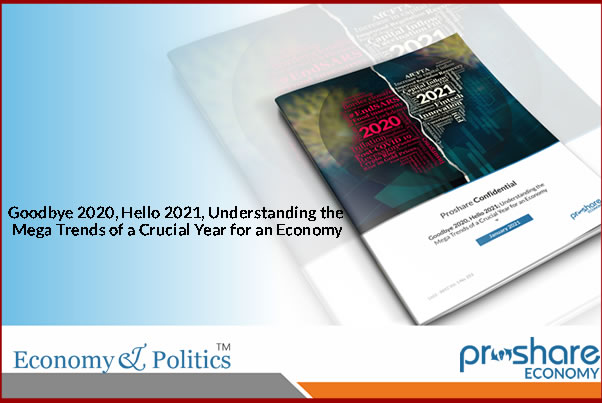
 3937 views
3937 views





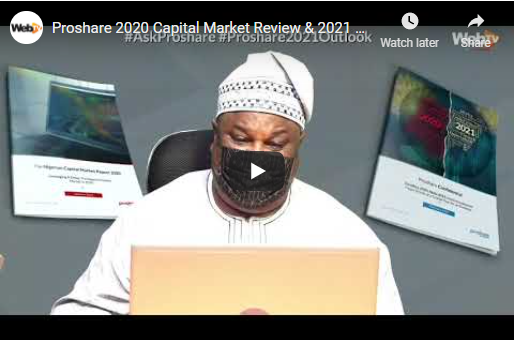
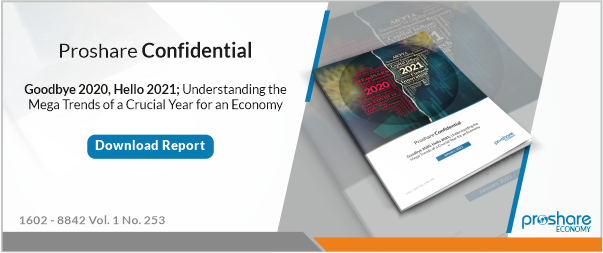
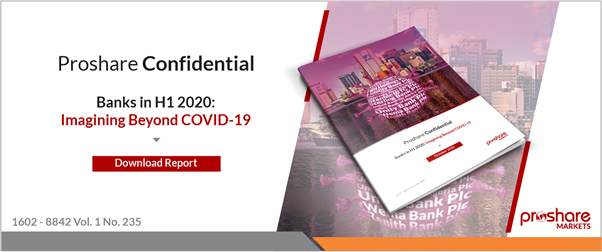







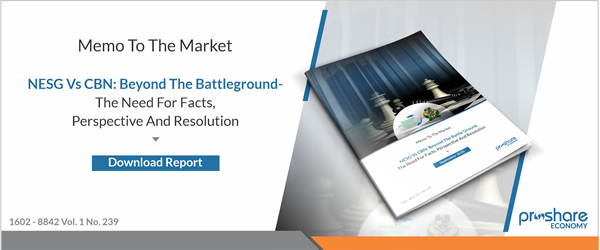





 Sponsored Ad
Sponsored Ad
 Advertise with Us
Advertise with Us









